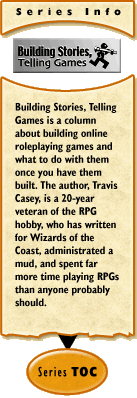
|
Exploring Genres: Horror, Part 2 — Fear Itselfby Travis S. Casey Last time in this column, I talked about the genre of horror, and how it's about fear. The column was mostly about how we can't really feel afraid for a character unless we feel some sort of attachment to that character. Once you have that attachment, though, what then? Well, the time has come to talk of fear. What makes you afraid? When you wake in the dark of night, clutching the covers about you, what is it that you hope not to see? There are all the standard monsters, of course — vampires, werewolves, zombies, and such. But it's hard to scare gamers with those, when they've spent so much time hunting down those same sorts of monsters in fantasy games, and even in some games that bill themselves as horror. You can't really be afraid of something that isn't a threat. You can, of course, go bigger and badder — tougher monsters, more monsters, etc. But that's the same direction that fantasy games take as well, giving more and tougher monsters as characters get more powerful. The players all but expect that — and what's known isn't frightening. So let's take a step back for a moment and ask ourselves — what scares us? Stephen King writes in his wonderful book Danse Macabre that horror takes us back to being children — to when we were huddled in our beds, afraid of what might be lurking in the closet. Or even under that seemingly warm, safe bed. Our childhood fears are always with us; they're wired into us on a genetic level, built into us by nature to keep us from wandering too far from the safety of the cave, out into the dark where bears and tigers and other predators lurk. Few of us live in places with those things any more, but those instincts are still there — and we'll always be afraid of those things on some level, simply because that's the way we're made. So what are those childhood fears?
We can bring almost all the themes of horror back to these two things — lack of knowledge and vulnerability. Consider the subgenre of conspiracy, as in the X-Files — it comes down to lack of knowledge (of what's really going on around us) and vulnerability (to Whomever's really running the show). The subgenre of "personal horror" as done in White Wolf's Vampire and Werewolf role-playing games, is about lack of control — lack of the ability to control yourself. I mentioned Stephen King's book Danse Macabre above. In it, King talks about a couple of other things people fear — and one of those is what he calls The Bad Death. We're all afraid of death (which, I think, goes back again to lack of knowledge and lack of control — who really knows what death will bring? And who can really control when and how they will die?), but we're more afraid of some deaths than others. People say, "When I go, I want to..." — and none of them say, "... be eaten by zombies." Or, "... be chopped up by a madman." To close out my thoughts on horror, I'd like to say that I think horror can serve two purposes: one is a catharsis — to come through something that scares us, and have things come out "all right" in the end. The other is to show us a vision of how bad things could be — to let us think, "You know, this isn't so bad after all."
|
